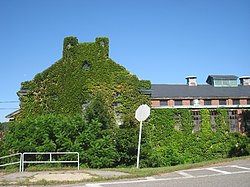Walter E. Fernald State School
|
Walter E. Fernald State School
|
|
 |
|
| Location | 200 Trapelo Rd., Waltham, Massachusetts |
|---|---|
| Coordinates | 42°23′28″N 71°12′38″W / 42.39111°N 71.21056°WCoordinates: 42°23′28″N 71°12′38″W / 42.39111°N 71.21056°W |
| Built | 1888 |
| Architect | William G. Preston; Clarence P. Hoyt |
| Architectural style | Greek Revival, Queen Anne, Late 19th And 20th Century Revivals |
| MPS | Massachusetts State Hospitals And State Schools MPS |
| NRHP Reference # | 93001487 |
| Added to NRHP | January 21, 1994 |
The Walter E. Fernald State School, later the Walter E. Fernald Developmental Center (aka Fernald Developmental Center or simply Fernald), was the Western hemisphere's oldest publicly funded institution serving people with developmental disabilities. Originally a Victorian sanatorium, it became a "poster child" for the American eugenics movement during the 1920s. It later was the scene of medical experiments in the 20th century. Investigations into this research led to new regulations regarding human research in children.
The school occupies a 186 acres (75 ha) property off Trapelo Road in Waltham, Massachusetts.
The Fernald Center, originally called the Experimental School for Teaching and Training Idiotic Children, was founded by reformer Samuel Gridley Howe in 1848 with a $2,500 appropriation from the Massachusetts State Legislature. The school eventually comprised 72 buildings total, located on 196 acres (0.79 km2). At its peak, some 2,500 people were confined there, most of them "feeble-minded" boys.
Under its third superintendent, Walter E. Fernald (1859–1924), an advocate of eugenics, the school was viewed as a model educational facility in the field of mental retardation. It was renamed in his honor in 1925, following his death the previous year. The institution was involved in several different procedures that used the residents as test subjects some of which include sterilization and radiation experimentation.
The institution did serve a large population of mentally retarded children, but The Boston Globe estimates that upwards of half of the inmates tested with IQs in the normal range. In the 20th century, living conditions were spartan or worse; approximately 36 children slept in each dormitory room. There were also reports of physical and sexual abuse. This situation changed in the 1970s, when a class action suit, Ricci v. Okin, was filed to upgrade conditions at Fernald and several other state institutions for persons with mental retardation in Massachusetts. U.S. District Court Judge Joseph Louis Tauro, who assumed oversight of the case in 1972, formally disengaged from the case in 1993, declaring that improvements in the care and conditions at the facilities had made them "second to none anywhere in the world". A result for Fernald residents of the class action suit which took effect in 1993 was the provision of "a guaranteed level of care, regardless of cost, to compensate for decades of neglect and abuse".
...
Wikipedia


